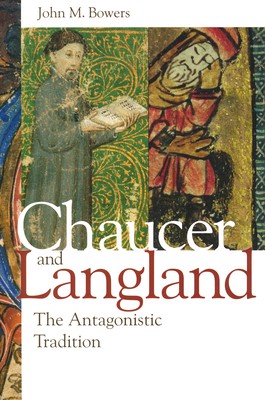
- We will send in 10–14 business days.
- Author: John M Bowers
- Publisher: University of Notre Dame Press
- ISBN-10: 026802202X
- ISBN-13: 9780268022020
- Format: 15.9 x 23.2 x 2.5 cm, softcover
- Language: English
- SAVE -10% with code: EXTRA
Reviews
Description
Although Geoffrey Chaucer and William Langland together dominate fourteenth-century English literature, their respective masterpieces, The Canterbury Tales and Piers Plowman, could not be more different. While Langland's poem was immediately popular and influential, it was Chaucer who stood at the head of a literary tradition within a generation of his death. John Bowers asks why and how Chaucer, not Langland, was granted this position. His study reveals the political, social, and religious factors that contributed to the formation of a literary canon in fourteenth-century England.
Through extensive manuscript evidence, Bowers tracks the reputations of the two writers into the fifteenth century, when studies of fourteenth-century literature became more clearly configured in terms of a double, antagonistic dynamic. Langland remained the largely invisible presence against which the official Chaucerian tradition was constructed. Never really separate, the two literary traditions constantly interacted, with the reputation of Chaucer the court poet eclipsing that of Langland the dissenter and critic. By examining the historical and social contexts within which these traditions arose, Bowers helps us to understand how some texts and writers become canonical and how others become marginalized.
EXTRA 10 % discount with code: EXTRA
The promotion ends in 18d.06:48:55
The discount code is valid when purchasing from 10 €. Discounts do not stack.
- Author: John M Bowers
- Publisher: University of Notre Dame Press
- ISBN-10: 026802202X
- ISBN-13: 9780268022020
- Format: 15.9 x 23.2 x 2.5 cm, softcover
- Language: English English
Although Geoffrey Chaucer and William Langland together dominate fourteenth-century English literature, their respective masterpieces, The Canterbury Tales and Piers Plowman, could not be more different. While Langland's poem was immediately popular and influential, it was Chaucer who stood at the head of a literary tradition within a generation of his death. John Bowers asks why and how Chaucer, not Langland, was granted this position. His study reveals the political, social, and religious factors that contributed to the formation of a literary canon in fourteenth-century England.
Through extensive manuscript evidence, Bowers tracks the reputations of the two writers into the fifteenth century, when studies of fourteenth-century literature became more clearly configured in terms of a double, antagonistic dynamic. Langland remained the largely invisible presence against which the official Chaucerian tradition was constructed. Never really separate, the two literary traditions constantly interacted, with the reputation of Chaucer the court poet eclipsing that of Langland the dissenter and critic. By examining the historical and social contexts within which these traditions arose, Bowers helps us to understand how some texts and writers become canonical and how others become marginalized.


Reviews